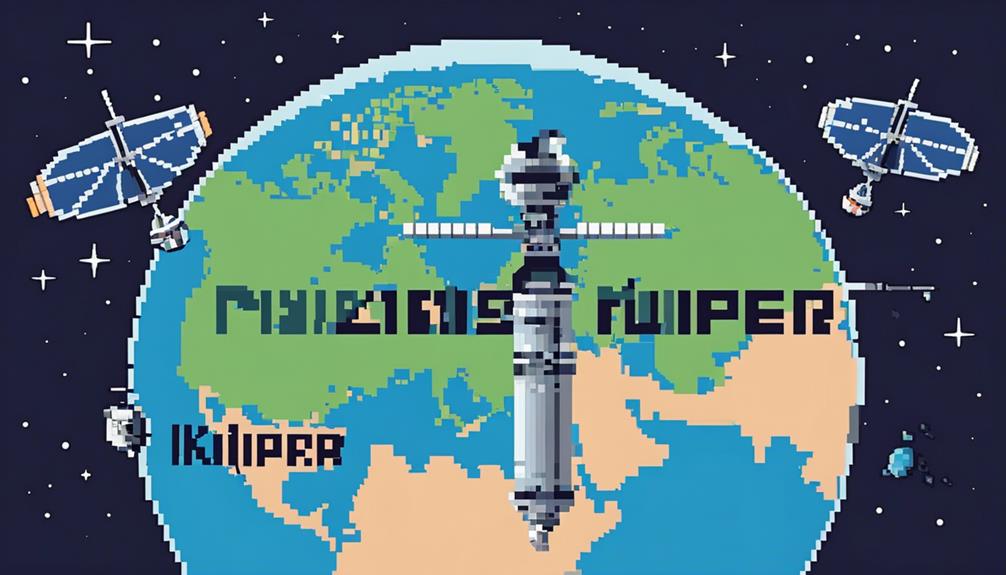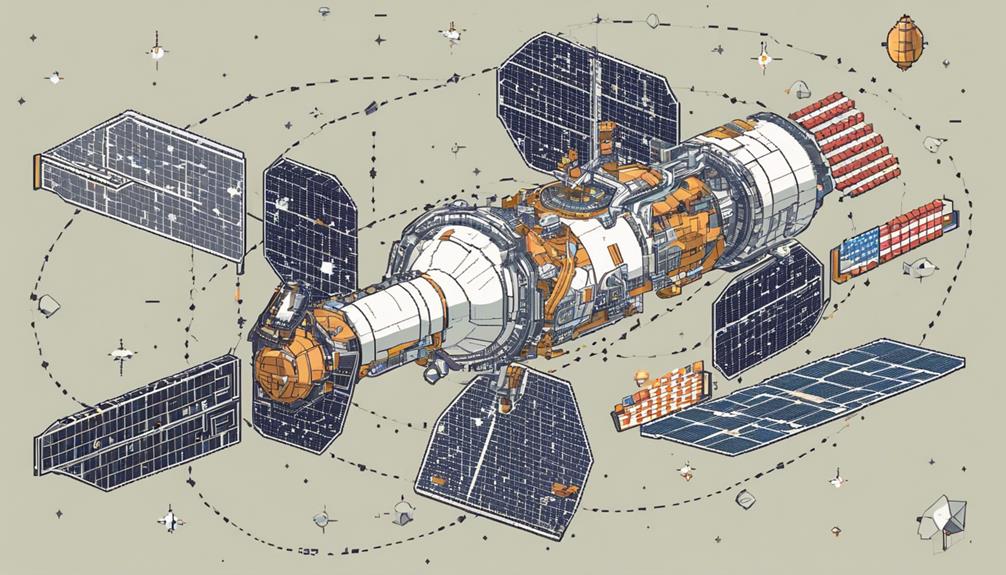Amazon's Project Kuiper has emerged as a formidable contender in the satellite internet space, boasting plans to deploy an extensive network of satellites for global connectivity. With successful tests and strategic partnerships, Amazon is positioning itself to challenge established players like Starlink. The technical prowess, coupled with a focus on customer accessibility, hints at Amazon's ambitions to revolutionize the telecommunications industry. As Project Kuiper gears up to launch, the implications for consumers and competitors alike are substantial.
Key Takeaways
- Beta program targets underserved areas with high-speed internet.
- Competitive pricing strategy for residential users at $90 per month.
- Amazon's investment exceeds $10 billion for global connectivity.
- Partnership with Blue Origin ensures regulatory compliance and successful expansion.
Project Kuiper Availability

The availability timeline for Project Kuiper's satellite internet service is set to commence with a beta program launch by Amazon in the latter half of 2024. This beta program will mark the initial phase of making Project Kuiper accessible to users, paving the way for its eventual residential use. The focus on residential use highlights Amazon's intent to provide high-speed internet services to households, especially in underserved or remote areas.
The beta program for Project Kuiper signifies a crucial step towards achieving widespread availability and adoption. By targeting residential users, Amazon aims to bridge the digital divide and bring reliable internet connectivity to areas where traditional terrestrial networks may be limited or non-existent. This move aligns with Amazon's broader vision of enhancing connectivity globally and fostering digital inclusion.
As the beta program progresses, Amazon will likely gather valuable feedback from participants to refine and optimize Project Kuiper's performance for broader residential deployment. This iterative approach ensures that the service meets the needs and expectations of users, ultimately enhancing its market competitiveness and user satisfaction. The upcoming beta program launch signifies a significant milestone in Amazon's journey to establish Project Kuiper as a prominent player in the satellite internet space, offering reliable connectivity solutions for residential users in the near future.
Signing Up for Project Kuiper
Individuals interested in joining Amazon's Project Kuiper can reach out directly to Amazon to express their interest and potentially be a part of the beta program scheduled for the latter half of 2024. The registration process overview, eligibility criteria details, and benefits of participation are crucial points to consider when signing up for Project Kuiper, with residential use of the internet service set to follow after the initial commercial rollout. Stay informed about signing up, pricing, and launch dates by following Amazon's official updates on Project Kuiper.
Registration Process Overview
Interested parties can initiate the process of signing up for Project Kuiper by contacting Amazon directly. As Amazon gears up to launch its beta program for Project Kuiper in the latter half of 2024, individuals can express their interest to be part of this groundbreaking initiative. To stay informed and receive updates regarding signing up, pricing details, and launch dates for Project Kuiper, it is advisable to regularly check Amazon's official page dedicated to registration information. The registration process will likely involve the following steps:
- Contacting Amazon directly to express interest.
- Remaining updated on the latest news through Amazon's official channels.
- Waiting for further details on the registration process to be released periodically.
Eligibility Criteria Details
To be considered for participation in Project Kuiper, potential users must meet specific eligibility criteria outlined by Amazon. Interested individuals can express their interest in the program directly to Amazon. The beta program for Project Kuiper is scheduled to commence in the latter half of 2024, with residential internet service following the initial commercial rollout. Details regarding signing up, pricing, and launch dates for Project Kuiper will be regularly communicated by Amazon. For those keen on staying informed about Project Kuiper's developments, it is advisable to follow Amazon's official page for updates. Keep in mind that meeting Amazon's eligibility criteria is crucial for being considered as a participant in this innovative project.
Benefits of Participation
Participation in Project Kuiper offers access to broadband speeds that adhere to FCC standards, ensuring reliable connectivity for users. Project Kuiper's benefits include:
- High-Speed Connectivity: By utilizing a network of satellites, Project Kuiper aims to deliver high-speed broadband internet to underserved areas.
- Early Access Opportunities: Signing up for Project Kuiper's beta program could grant users early access to test the high-speed internet services before the full-scale rollout.
- Direct Engagement: Expressing interest in Project Kuiper directly with Amazon can secure a spot in the program, allowing participants to be among the first to experience the benefits of this innovative satellite-based internet service.
Understanding Project Kuiper
Project Kuiper, Amazon's ambitious undertaking, aims to establish a vast network of satellites to provide global internet access. This initiative involves deploying more than 3,200 satellites into low Earth orbit to offer broadband internet services. Amazon's prototype satellites, KuiperSat-1 and KuiperSat-2, have undergone successful testing to ensure their functionality in delivering high-speed internet connectivity.
With a focus on meeting FCC standards for broadband speeds, Amazon plans to bridge the digital divide by providing internet access to underserved regions worldwide. Project Kuiper is poised to offer reliable connectivity to areas where traditional internet infrastructure is lacking or insufficient. The project's ultimate goal is to enable global internet access, supporting various applications and services that rely on a stable internet connection.
Amazon's beta program for Project Kuiper is scheduled to commence in the latter half of 2024, marking the initial phase of commercial deployment. Following the beta phase, Amazon aims to extend the service for residential use, making broadband internet more accessible to households in remote or rural areas. Through Project Kuiper, Amazon is poised to revolutionize the satellite internet landscape, offering enhanced connectivity options on a global scale.
Comparing Satellite Internet Providers

Among the leading satellite internet providers in the market, Starlink and Viasat currently offer the fastest services available, catering to a wide range of user needs. When comparing satellite internet providers, it's essential to consider factors such as speed, coverage, and pricing. Here are some key points to help you differentiate between these providers:
- Starlink: Known for its high-speed internet services, Starlink is a frontrunner in the satellite internet market. It offers reliable connectivity, especially in remote areas where traditional internet options are limited.
- Viasat: Viasat stands out for its range of plans tailored to different user requirements. With varying speeds and data caps, Viasat provides flexibility for customers to choose a plan that aligns with their usage patterns.
- HughesNet: While not as fast as Starlink or Viasat, HughesNet focuses on affordability and increased data caps. This makes it a suitable option for users looking for cost-effective satellite internet solutions.
As Amazon's Project Kuiper enters the satellite internet service arena, competition is expected to intensify. With its global mesh network, Project Kuiper aims to challenge existing providers by offering competitive services. Keep an eye on how Amazon's entry impacts the dynamics of the satellite internet market.
Pricing for Amazon Internet Service
Amazon's residential internet service through Project Kuiper is poised to launch at a competitive starting price of $90 per month. This pricing strategy aligns with Amazon's goal to establish a strong presence in the satellite internet market, directly competing with providers like Starlink. While the specific costs of Project Kuiper's equipment and service are still pending, Amazon has indicated that the customer terminals are expected to be priced below $400. By keeping these costs low, Amazon aims to attract customers by offering an affordable alternative to existing satellite internet options.
In the satellite internet industry, pricing plays a crucial role in customer acquisition and retention. Amazon's decision to position Project Kuiper's monthly subscription at $90 demonstrates a strategic approach to penetrate the market while maintaining competitiveness. Furthermore, the affordability of the customer terminals under $400 reflects Amazon's commitment to making its service accessible to a wide range of consumers.
As Amazon prepares to launch Project Kuiper, pricing will continue to be a focal point in shaping its market positioning and success. By offering a compelling price point coupled with reliable service, Amazon is positioning itself as a formidable player in the satellite internet landscape, poised to capture market share and drive innovation in the industry.
Ownership of Project Kuiper

Project Kuiper, Amazon's satellite internet initiative, is fully owned and operated by the tech giant Amazon. As such, the project's ownership structure is closely tied to Amazon's strategic vision and business objectives. Understanding Project Kuiper's ownership will shed light on its investors, regulatory compliance status, and future expansion plans.
Project Kuiper's Investors
Funded by Amazon with an investment exceeding $10 billion, Project Kuiper is under the ownership of the tech giant, positioning it as a formidable player in the satellite internet industry.
- Blue Origin, Jeff Bezos' aerospace company, is responsible for launching Project Kuiper's satellites into orbit using the New Glenn launch vehicle.
- Amazon's ownership of Project Kuiper enables the company to compete with established satellite internet providers like SpaceX's Starlink.
- The significant financial backing from Amazon ensures Project Kuiper's scalability and long-term sustainability in the satellite internet market.
Regulatory Compliance Status
With Project Kuiper's regulatory compliance status firmly established, Amazon's foray into the satellite internet market is poised for success. Project Kuiper, owned by Amazon and utilizing Blue Origin for satellite launches, has received approval from the Federal Communications Commission (FCC) for its satellite constellation deployment. Amazon's adherence to international regulations regarding satellite deployment ensures compliance for Project Kuiper's global internet service. The ownership of Project Kuiper falls within Amazon's diverse portfolio of ventures and initiatives, cementing its commitment to the project's success. Regulatory compliance not only demonstrates Amazon's commitment to operating within legal frameworks but also paves the way for Project Kuiper to navigate the complexities of satellite internet services effectively.
Future Expansion Plans
Amazon's strategic vision for expanding Project Kuiper involves positioning the company as a formidable contender in the satellite internet market.
- Amazon's Sole Ownership: Amazon is the sole owner of Project Kuiper, committing to invest over $10 billion in the venture.
- Launch Vehicles: Blue Origin, Jeff Bezos' aerospace company, will use the New Glenn launch vehicle to deploy Project Kuiper's satellites into orbit.
- Competition: Project Kuiper aims to maintain equipment costs for customers below $400, directly competing with other satellite internet providers like Starlink.
With these ambitious future expansion plans, Amazon's ownership of Project Kuiper sets the stage for a robust challenge to existing players in the satellite internet market, offering competitive pricing starting at $90 per month for residential users.
Goals of Project Kuiper

Aiming to revolutionize global connectivity, Project Kuiper seeks to provide high-speed internet access to remote areas through innovative technologies and services. The project's primary goal is to bridge the digital divide by offering satellite broadband services using Amazon satellites to deliver high-speed internet access to underserved populations worldwide. Project Kuiper aims to compete directly with existing satellite internet providers like Starlink, envisioning a future where individuals in even the most remote locations can enjoy seamless connectivity.
Goals of Project Kuiper
| Goals | Description |
|---|---|
| Provide High-Speed Internet Access | Utilize Amazon satellites to deliver broadband data services to connect remote areas globally |
| Offer Rooftop Antennas | Enable seamless connectivity through innovative rooftop antennas for efficient data transfer |
| Establish Amazon as a Major Player | Compete with existing satellite internet providers to become a significant industry contender |
| Expand Cloud Services | Enhance connectivity by providing cloud services to support a wide range of online activities |
Through these strategic initiatives, Project Kuiper aims to establish Amazon as a key player in the satellite internet service industry, catering to the connectivity needs of populations in remote and rural areas.
Launch Partners for Project Kuiper
Securing launch contracts with United Launch Alliance (ULA), Arianespace, and Blue Origin, Amazon has made substantial investments totaling approximately $7.4 billion over five years for the deployment of Project Kuiper's satellites. The collaboration with these renowned launch partners underscores Amazon's commitment to the successful launch and expansion of the Project Kuiper satellite network. This strategic partnership ensures access to reliable and efficient launch services critical for deploying the extensive constellation of satellites into orbit.
Key Points:
- United Launch Alliance (ULA): Amazon's partnership with ULA signifies a reliance on ULA's proven track record in launching satellites, ensuring the successful deployment of Project Kuiper's satellites.
- Arianespace: The collaboration with Arianespace highlights Amazon's global approach to satellite deployment, leveraging Arianespace's expertise in providing launch services from multiple launch sites.
- Blue Origin: Amazon's association with Blue Origin, a space company founded by Amazon's Jeff Bezos, further solidifies the commitment to leveraging cutting-edge technology and innovation in satellite launches for Project Kuiper.
In essence, Amazon's selection of these launch partners demonstrates a strategic investment in ensuring the efficient and successful deployment of Project Kuiper's satellite network, laying the foundation for Amazon's significant presence in the satellite internet space.
Relationship With Blue Origin

The collaboration with Blue Origin, led by Jeff Bezos, is pivotal for the successful deployment of Project Kuiper's satellite constellation. Blue Origin, as the launch provider, will utilize its New Glenn rocket to carry Project Kuiper's satellites into orbit. This partnership is fundamental in ensuring the efficient and timely establishment of the satellite constellation.
Blue Origin's New Glenn rocket is specifically designed to handle the heavy payloads required for deploying Project Kuiper's extensive satellite network. The reliability and cost-effectiveness of Blue Origin's launch services further solidify the strategic advantage of this collaboration. By leveraging Blue Origin's expertise in space transportation, Project Kuiper gains a competitive edge in the satellite deployment sector.
The relationship with Blue Origin underscores Amazon's commitment to executing Project Kuiper with precision and innovation. By entrusting the launch responsibilities to Blue Origin, Project Kuiper can focus on optimizing the performance and capabilities of its satellite constellation. This strategic approach highlights Amazon's dedication to establishing Project Kuiper as a significant player in the satellite communication industry. In essence, the alliance between Project Kuiper and Blue Origin represents a cornerstone in the successful implementation of Amazon's ambitious satellite project.
Frequently Asked Questions
Will Project Kuiper Be Successful?
The success of Project Kuiper hinges on several critical factors: market potential, competition, technology advancements, scalability, consumer adoption, and regulatory challenges. These elements collectively determine the project's feasibility and viability. Understanding the market demand, outperforming competitors, implementing cutting-edge technology for scalability, ensuring widespread consumer adoption, and navigating regulatory hurdles are pivotal in determining the success of Project Kuiper in the satellite internet market.
Why Is Amazon Doing Kuiper?
Amazon is exploring opportunities in the future market of satellite internet by investing in Project Kuiper. By leveraging advanced technology and strategic partnerships, Amazon aims to address the global demand for high-speed internet connectivity, particularly in underserved areas. The initiative seeks to bridge the digital divide, providing educational and commercial opportunities to regions lacking reliable internet access. This endeavor aligns with Amazon's commitment to innovation and expanding its service offerings.
Which Company Is Under Project Kuiper?
Amazon is the company undertaking the satellite internet project. Through this initiative, Amazon aims to provide global internet connectivity using a network of satellites. This venture is part of Amazon's strategy to compete in the telecommunications industry, offering high-speed internet services worldwide. The project involves a substantial investment by Amazon to deploy over 3,200 satellites for enhanced internet access.
How Is Project Kuiper Different From Starlink?
In comparison to Starlink, Project Kuiper distinguishes itself through its innovative technology, offering a global mesh network with low latency and high transmission speeds. Kuiper's coverage is characterized by over 3,200 satellites in low Earth orbit, facilitating broadband speeds meeting FCC standards. This setup allows for improved connectivity and download speeds of up to 400 Mbps. Kuiper's customer terminals, priced competitively, further enhance its position as a formidable alternative in the satellite internet market.
